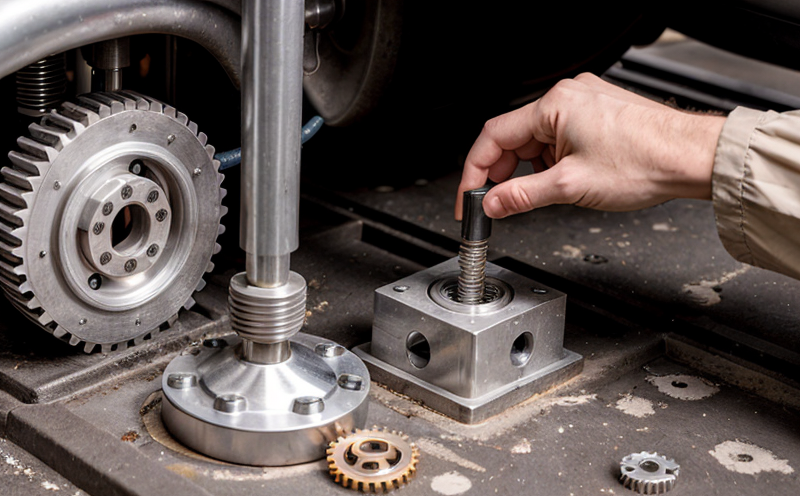ISO 899 Creep Testing of Plastics
The ISO 899 series provides a comprehensive set of standards and methods to evaluate the creep behavior of plastics under load. Creep testing is crucial for ensuring that materials used in demanding applications, such as automotive components, aerospace structures, and medical devices, can withstand long-term loads without excessive deformation or failure.
The ISO 899-1 standard specifically addresses the determination of the time to failure due to creep under constant temperature and load conditions. This test is particularly important for materials like polyethylene (PE), polypropylene (PP), polystyrene (PS), and other thermoplastics that are used in environments where they experience prolonged exposure to stress.
The testing process involves subjecting a specimen to a defined constant load at a specified temperature. The deformation of the material is measured over time, typically until it reaches a predetermined percentage elongation or strain rate. This data helps in understanding how the material deforms under continuous stress and provides insights into its durability and reliability.
The ISO 899-1 method requires careful specimen preparation to ensure accurate testing results. Specimens are cut from standard test bars, typically rectangular prisms, with dimensions that allow for consistent measurement of deformation. The specimens must be conditioned in a controlled environment before the test begins to achieve thermal and mechanical equilibrium.
The test setup includes a universal testing machine equipped with a suitable fixture capable of applying the specified load accurately. Temperature control is critical, as it directly influences the material’s creep behavior. A constant temperature chamber or a water bath may be used depending on the required conditions. The load application and deformation measurement are automated to ensure precision.
Once the test begins, the machine continuously applies the load while monitoring the specimen's dimensional changes using strain gauges or other displacement sensors. The data collected is analyzed to determine the stress at which the material starts to deform irreversibly. This information helps in assessing the material’s long-term mechanical performance and its suitability for specific applications.
Understanding creep behavior through ISO 899 testing is vital because many real-world applications involve components that operate under constant or fluctuating loads over extended periods. For instance, automotive bumpers need to withstand years of exposure to environmental factors like sunlight, temperature changes, and mechanical stress from driving conditions. Similarly, aerospace structures must endure extreme temperatures during launch and re-entry.
Compliance with ISO standards ensures that materials meet regulatory requirements and industry best practices. This is particularly important in sectors where safety and reliability are paramount. By conducting ISO 899 creep tests, manufacturers can ensure their products meet the necessary performance criteria and avoid costly failures in service.
- Customer Impact: Ensures long-term durability of plastic components used in critical applications such as automotive, aerospace, and medical devices. Improves product reliability and extends service life.
- Safety: Prevents premature failure of materials under continuous stress, enhancing safety standards across various industries.
- Quality Assurance: Provides quantitative data that can be used to compare material performance across different suppliers or batches. This ensures consistent quality in production processes.
Eurolab Advantages
At Eurolab, we pride ourselves on offering world-class testing services that meet the highest standards of accuracy and reliability. Our ISO 899 creep testing service is no exception, providing comprehensive support to our clients in the additive manufacturing and 3D printing sectors.
Our state-of-the-art facilities are equipped with advanced equipment capable of precise temperature control and accurate load application. This ensures that every test conducted under ISO 899 standards is as close as possible to real-world conditions, yielding reliable results. Our experienced technicians are trained in the latest testing methodologies and adhere strictly to international standards.
We offer a range of additional services tailored to meet our clients’ specific needs. These include custom specimen preparation, detailed analysis of test data, and comprehensive reporting with recommendations for material selection and optimization. Our team is committed to helping you achieve compliance with ISO 899 while also optimizing your product performance.
Our commitment to quality extends beyond just the testing process. We provide ongoing support throughout the project lifecycle, ensuring that our clients have access to all necessary resources and expertise. Whether you are a small startup or a large corporation, Eurolab is dedicated to delivering exceptional service and value to your organization.
Our success stories include working with leading companies across various sectors who rely on us for their critical testing needs. By choosing Eurolab, you can rest assured that your materials will undergo the most rigorous and accurate testing available today.
International Acceptance and Recognition
The ISO 899 series of standards is widely recognized and accepted across the globe for its comprehensive approach to evaluating creep behavior in plastics. This international acceptance ensures that testing results are comparable worldwide, facilitating global trade and collaboration.
Many industries rely on these standards to ensure compliance with regulatory requirements and industry best practices. By adhering to ISO 899, manufacturers can demonstrate their commitment to quality and reliability, which is increasingly becoming a competitive advantage in today’s market. The consistent application of these standards also fosters trust among stakeholders, from suppliers to end users.
In summary, the acceptance and recognition of ISO 899-1 creep testing are integral components of ensuring that materials used in critical applications meet stringent performance criteria. This global standardization supports innovation while maintaining high safety and quality standards across various sectors.





